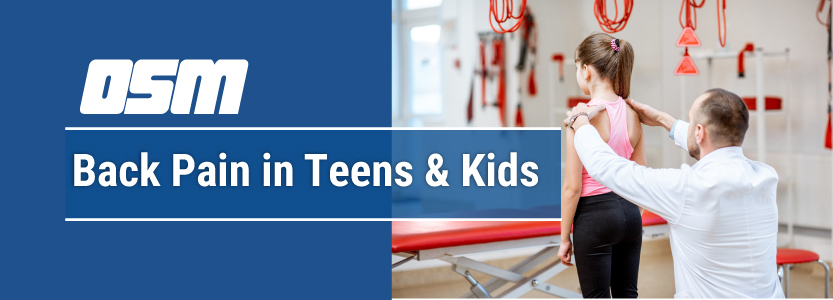Types of Back Pain in Kids and Teens
Based on the underlying cause, a few types of back pain experienced by children may include :
- Acute pain. A sharp, stabbing, and/or shooting pain may occur in event of an injury, trauma, fracture of the vertebra or vertebral growth plate, or herniated disc.
- Chronic pain. A constant ache, pain that comes and goes, or posture-related pain may occur due to inflammatory spondyloarthropathies, psychological issues, or developmental problems, such as Scheuermann’s disease.
- Pain that worsens with spinal movement. Flexion (forward bending) increases pressure on the front part of the spinal bones, aggravating pain from conditions such as a herniated disc, discitis, osteomyelitis, or vertebral body tumor.Extension (backward bending) of the spine increases the strain on the posterior part of the spinal bones, including the facet joints, pars interarticularis, and pedicles. A lesion or injury, such as an osteoid osteoma, osteoblastoma, or spondylolysis, in this area can cause pain while bending backward.
- Night-time pain. Frequent pain that occurs at night and awakens the child is typically associated with tumors or infections, such as osteomyelitis, discitis, osteoid osteoma, osteoblastoma, eosinophilic granuloma, aneurysmal bone cyst, leukemia, Ewing’s sarcoma, or spinal cord tumors.
Night-time back pain in children and teens warrants immediate medical attention.
Backpacks and Back Pain
There is some evidence to suggest that heavy backpacks may cause back pain in children.
- Habitually carrying heavy backpacks over one shoulder may cause the muscles in the area to strain in order to compensate for the uneven weight, resulting in localized or one-sided pain in the shoulder and upper back.
- Heavy backpacks may strain the neck muscles, contributing to or worsening existing back pain, shoulder pain, and arm pain.
- Improperly loading a backpack and stooping forward while walking can distribute weight unevenly within the bag, causing strain on the back muscles.
The American Academy of Pediatrics’ most recent non-evidence-based guidelines recommend that the optimal weight of a child’s backpack may be restricted to 10% to 20% of the child’s body weight. Certainly if a child or teen complains about back pain after carrying their backpack, it is reasonable to try reducing the weight of the backpack, use a rolling pack, or explore other remedies.
Back Pain in Children and Adolescents Must Be Evaluated at the Earliest
Any complaint by a child or teenager about acute back pain or chronic back pain is taken seriously by pediatricians and is usually followed up with a detailed consultation that will include a review of the child’s medical history, an in-depth physical exam, and a psychological evaluation, if warranted.
If the medical history and physical examination suggest an underlying condition, a series of tests may be conducted. These tests typically include blood tests and radiographic imaging studies, with a possible referral to a specialist for further examination and diagnostic tests.
When Back Pain in Kids and Teens May Be Serious
Back pain, specifically severe pain in the lower back region in children under 10 years of age and particularly in those younger than 4 years, should be considered a red flag for serious underlying pathologies, which may include:
- Vertebral fracture
- Spinal tumors
- Infectious diseases
- Cauda equina syndrome
Spinal tumors and fractures may be associated with additional symptoms, such as fatigue, stiffness in the spine upon waking in the morning, weight loss, loss of appetite, fever, and/or local tenderness on the spine. Night pain, pain that awakens the child from sleep, and pain at rest may be specific to tumors.
Mild to moderate back pain in kids and teens may occur due to a sudden, direct hit to the back or as a result of a fall (such as while playing on a playground or participating in sports), and usually resolves within a few days with self-care and/or over-the-counter medications. Persistent, progressive, and/or severe back pain may indicate a serious medical condition and it is advisable to get medical help right away.



